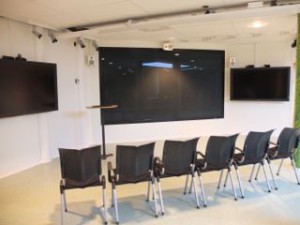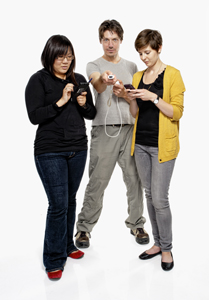Clay Shirky has a good essay on Napster, Udacity, and the Academy on his blog which considers who will be affected by MOOCs. He makes a number of interesting points:
- A number of the changes that Internet has facilitated involved unbundling services that were bundled in other media. He gives the example of individual songs being unbundled from albums, but he could also have mentioned how classifieds have been unbundled from newspapers. Likewise MOOCs (Massive Open Online Courses), like the Introduction to Artificial Intelligence run by Peter Norvig and Sebastian Thrun at Stanford, unbundle the course from the university and certification.
- University lectures are inefficient, a poor way of teaching, and often not of the highest quality. Chances are there are better video lectures online for any established subject than what is offered locally. If universities fall into the trap of saving money by expanding class sizes until higher education is just a series of lectures and exams then we can hardly pretend to higher quality than MOOCs. Why would students in Alberta want to listen to me lecture when they could have someone from Harvard?
- MOOCs are far more likely to threaten the B colleges than the elite liberal arts colleges. A MOOC is not a small seminar experience for a top student and doesn’t compete with the high end. MOOCs compete with lectures (why not have the best lecturer) and other passive learning approaches. MOOCs will threaten the University of Phoenix and other online programs that are not doing such a good job at retention anyway.
- MOOCs are great marketing for the elite universities which is why they may thrive even if there is no financial model or evaluation.
- The openness is important to MOOCs. Shirky gives the example of a Statistics 101 course that was improved by open criticism. By contrast most live courses aren’t open to peer evaluation. Instead they are treated like confidential instructor-patient interactions.
While I agree with much of what Shirky says and I welcome MOOCs I’m not convinced they will have the revolutionary effect some think they will. I remember seeing the empty television frames at Scarborough college from when they thought teleducation was going to be the next thing. When it comes to education we seem to forget over an over that there is a rich history of distance education experiments. Shirky writes, “In the academy, we lecture other people every day about learning from history. Now its our turn…” but I don’t see evidence that he has done any research into the history of education. Instead Shirky adopts a paradigm shift rhetoric comparing MOOCs to Napster in potential for disruption as if that were history. We could just as easily compare them to the explosion of radio experiments between the wars (that disappeared by 1940.) Just how would we learn from history? What history is relevant here? Shirky is unconvincing in his choice of Napster as the relevant lesson.
Another issue I have is epistemological – I just don’t think MOOCs are that different from a how-to book or learning video when it comes to the delivery of knowledge. Anyone who wants to learn something in the West has a wealth of choices and MOOCs, if well designed, are one more welcome choice, but revolutionary they are not. The difficult issues around education don’t have to do with quality resources, but with time (for people trying to learn while holding down a job), motivation (to keep at it), interaction (to learn from mistakes) and certification (to explain what you know to others).
Now its my turn to learn from history. I propose these possible lessons:
- Unbundling will have an effect on the university, especially as costs escalate faster than inflation. We cannot expect society to pay at this escalating rate especially with the cost of health care eating into budgets. Right now what seems to be being unbundled is the professoriate from teaching as more and more teaching is done by sessionals. Do we really want to leave experiments in unbundling exclusively to others or are we willing to take responsibility for experimenting ourselves?
- One form of unbundling that we should experiment with more is unbundling the course from the class. Universities are stuck in the course = 12/3 weeks of classes on campus. These are the easiest way for us to run courses as we have a massive investment in infrastructure, but they aren’t necessarily the most convenient for students or subject matter. For graduate programs especially we should be experimenting with hybrid delivery models.
- Universities may very well end up not being the primary way people get their post-secondary education. Universities may continue as elite institutions leaving it to professional organizations, colleges and distance education institutions to handle the majority of students.
- Someone is going to come up with a reputable certification process for students who want to learn using a mix of books, study groups, MOOCs, college courses and so on. Imagine if a professional organization like the Chartered Accountants of Canada started offering a robust certification process that was independent of any university degree. For a fee you could take a series of tests and practicums that, if passed, would get you provincial certification to practice.
- The audience for MOOCs is global, not local. MOOCs may be a gift we in wealthier countires can give to the educationally limited around the world. Openly assessed MOOCs could supplement local learning and become a standard against which people could compare their own courses. On the other hand we could end up with an Amazon of education where one global entity drives out all but the elite educational institutions (which use it to stay elite.) Will we find ourselves talking about educational security (a national needing their own educational system) and learning local (not taking courses from people that live more than 100K away)?
- We should strive for a wiki model for OOCs where they are not the marketing tools of elite institutions but maintained by the community.
In sum, we should welcome any new idea for learning, including MOOCs. We should welcome OOCs as another way of learning that may suit many. We should try developing OOCs (the M part we can leave to Stanford) and assess them. We should be open to different configurations of learning and not assume that how we do things now has any special privilege.



